Far-Right Populists Dominate German Facebook Ahead of EP Elections
Populist party AfD garnered the highest engagement rates among major German parties on Facebook
Far-Right Populists Dominate German Facebook Ahead of EP Elections
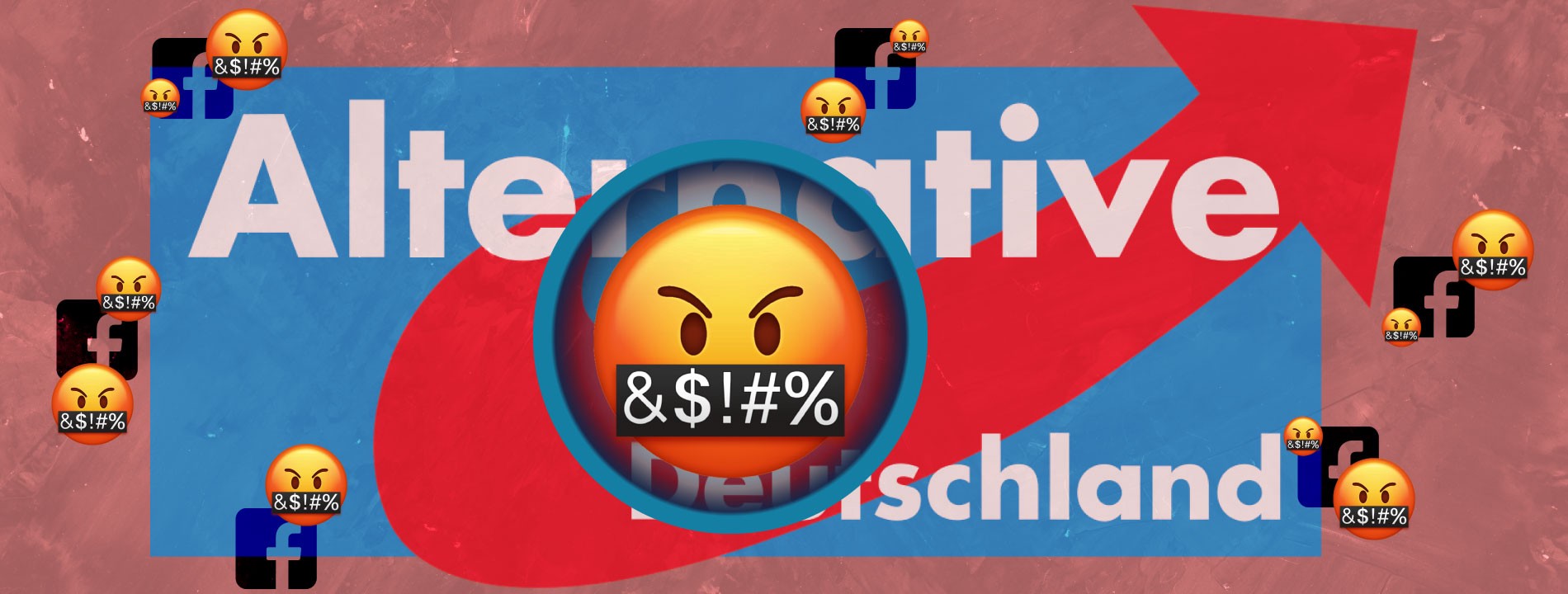
BANNER: (Source: @karankanishk/DFRLab)
Far-right populist German party AfD (Alternative for Germany) received more engagement on its official Facebook page than any other German party in the run-up to May’s European Parliament (EP) elections, according to an open-source investigation.
The European Union (EU) has recently faced the increasing influence of Eurosceptic, far-right populist parties in the upcoming EP elections. As the most populous country in the EU, Germany holds the most seats in the EP, and a favorable election result for the AfD would thus have a significant impact on the political composition of the EU’s primary legislative body. The AfD is infamous for its Eurosceptic and far-right positions, particularly around immigration, and currently holds the third most seats (91 of 709 total) of the parties in the Bundestag, the German federal parliament. AfD’s success in growing its representation in the Bundestag in the 2017 German elections could portend a similar representational increase in the EP elections.
Using CrowdTangle, the DFRLab analyzed all posts over a 30-day period featuring specific German keywords related to the EP elections. CrowdTangle tracks public content from Facebook pages and public groups, while automatically adding Facebook pages with more than 110,000 likes to its database. While the database is not representative, it can nonetheless indicate general trends in engagement for popular pages and groups over a certain period of time. This analysis focused on engagements and content on Facebook, as the platform is by far the most used social media platform in Germany.
High Facebook Engagements for AfD
An analysis of every Facebook post in CrowdTangle’s database with the keywords “Europawahl” (European election), “Europawahlen” (European elections), and “Europäische Union” (European Union) within a 30-day period (March 17-April 17, 2019) showed a clear engagement trend: out of the 20 most engaged-with Facebook posts mentioning the keywords, the AfD and its politicians together received by far the most engagements generally, including the major German parties, with 87,526 engagements.
According to a May 10 opinion poll regarding the European Parliament elections, released by German public broadcaster ZDF, the AfD has the fourth highest support among active parties, receiving approximately 12 percent of votes, behind CDU/CSU (32 percent), the Green Party (19 percent), and SPD (16 percent).
Altogether, AfD’s posts and those of its individual politicians that featured the keywords garnered more than two thirds (70 percent) of all engagement on Facebook. The keywords usually appeared together in the respective posts, with a single exception when the German keyword for the European Union occurred on its own. The overall engagement rate includes comments, likes, shares, as well as the entire emoji reaction range (“love,” “wow,” “haha,” “sad,” “angry”).

The most engaged-with post was published on the Facebook page of a satirical TV show on ZDF, though 15 of the 20 most engaged-with Facebook posts including the keywords were directly affiliated with AfD, illustrating a high engagement trend for the populist party’s content.


Far-right, Populist Facebook Posts
AfD’s Facebook posts — often accompanied by an election poster — usually concerned European political issues. At times, they encouraged dissatisfaction with other German political parties by criticizing their members or by oversimplifying their policy platforms.
In one such election poster, the AfD claimed that Bündnis 90/Die Grünen (The Greens) had pushed for the complete prohibition of gas and diesel by 2030. This characterization is inaccurate, however, as the Greens want to pave the way for a prohibition on the registration of non-emission-free cars starting in 2030, while still allowing those registered prior to 2030 on the streets following the prohibition.
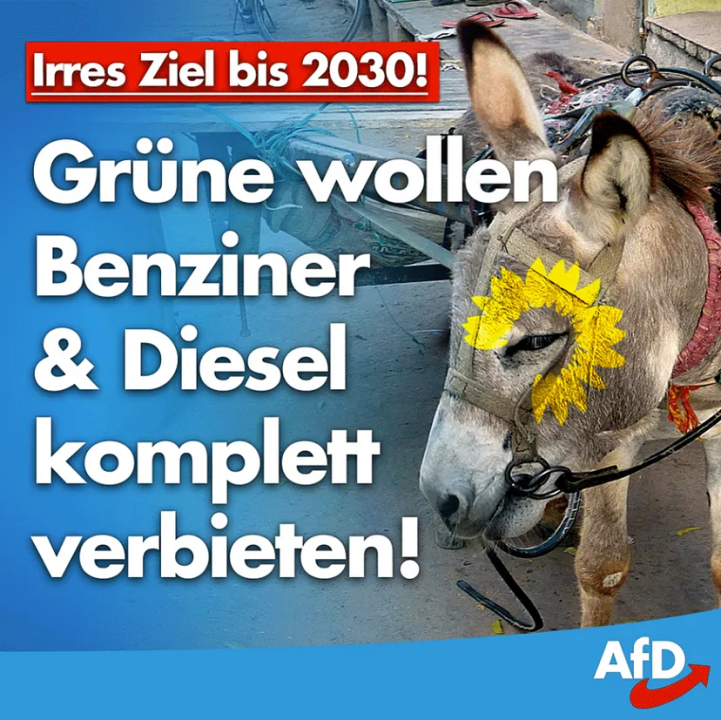
In another post, the AfD exploited a scandal regarding a politician from the SPD (Social Democratic Party of Germany) who had lied about his domicile and girlfriend. The AfD added a false accusation that he had also falsified his resume — a claim that was not featured in the article provided as source. In another Facebook post, the AfD claimed that Facebook allegedly restricted the reach of the populist party’s posts to the platform. The AfD did not elaborate any further on the alleged restriction.
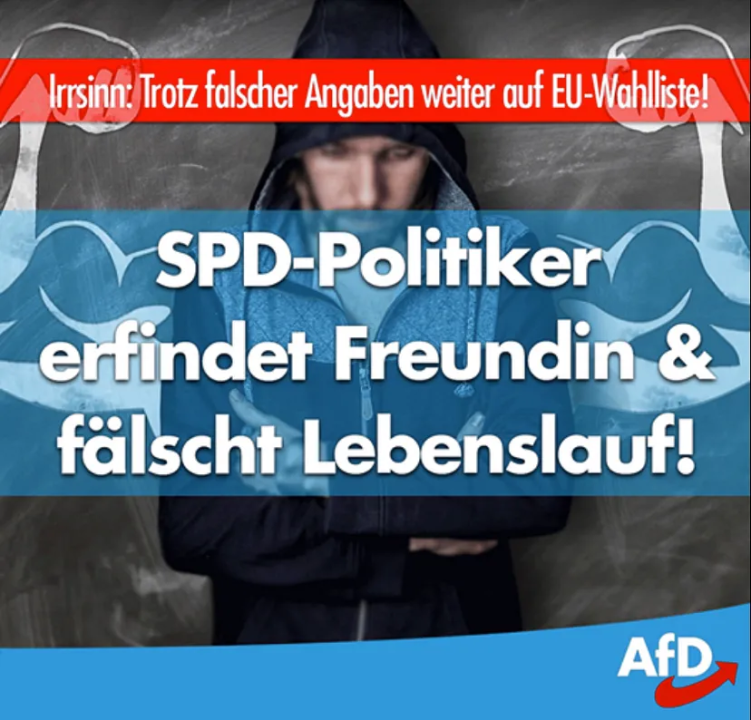
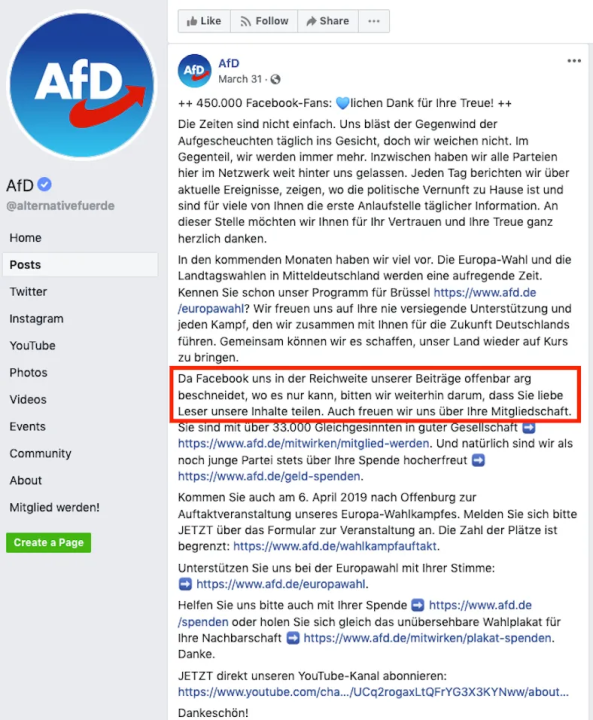
The AfD also posted about European and German asylum policies and the allegedly extremely low return rate of asylum-seekers to Greece according to the Dublin Regulation, which requires refugees to request asylum in the country of their first arrival in Europe. While the information about the return rates was accurate, the election poster oversimplified the manifold reasons resulting in the low rates, such as court decisions in favor of the asylum-seekers as well as the poor conditions and limited space in refugee shelters in Greece. During the refugee influx in 2015, Germany had temporarily ceased to comply with the Dublin Regulation in order to show solidarity with and relieve pressure for countries at the external border of the European Union.
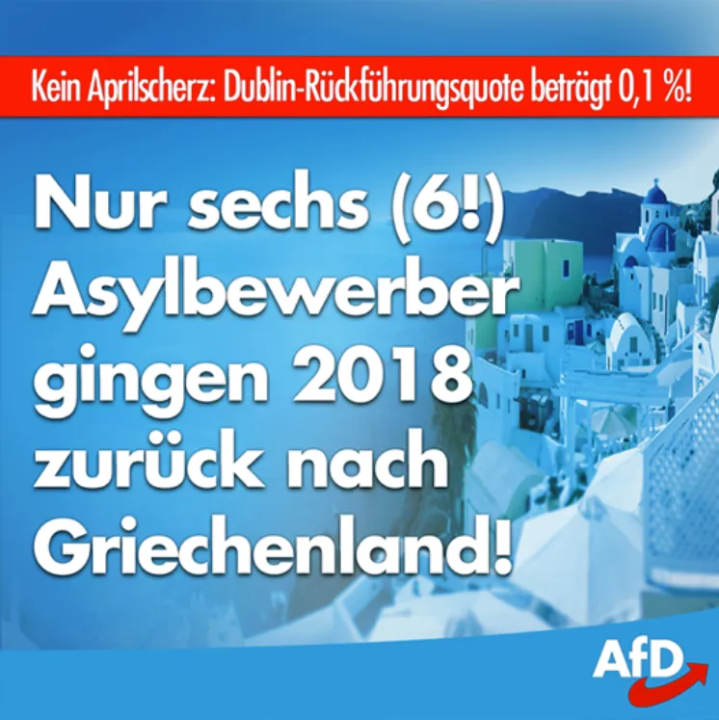
Major German Parties Cannot Keep Up
A CrowdTangle analysis of the official Facebook pages of the seven other parties in the Bundestag further backed the disproportionately high engagement rate with the populist party AfD’s page.
The DFRLab also monitored and analyzed the official Facebook pages of the CDU (Christian Democratic Union of Germany), CSU (Christian Social Union in Bavaria), SPD (Social Democratic Party of Germany), Bündnis 90/Die Grünen (Alliance 90/the Greens), FDP (Free Democratic Party), Die Linke (The Left), and AfD (Alternative for Germany) within the same period. The analysis, however, did not comprise any regional party pages.
According to the CrowdTangle analysis, AfD by far garnered the most engagements (below referenced as “interactions”) within the period of analysis. Out of the roughly 735,700 engagements on all content on the major parties’ Facebook pages, the AfD garnered a disproportionately significant 519,200 engagements, or 70.5 percent.
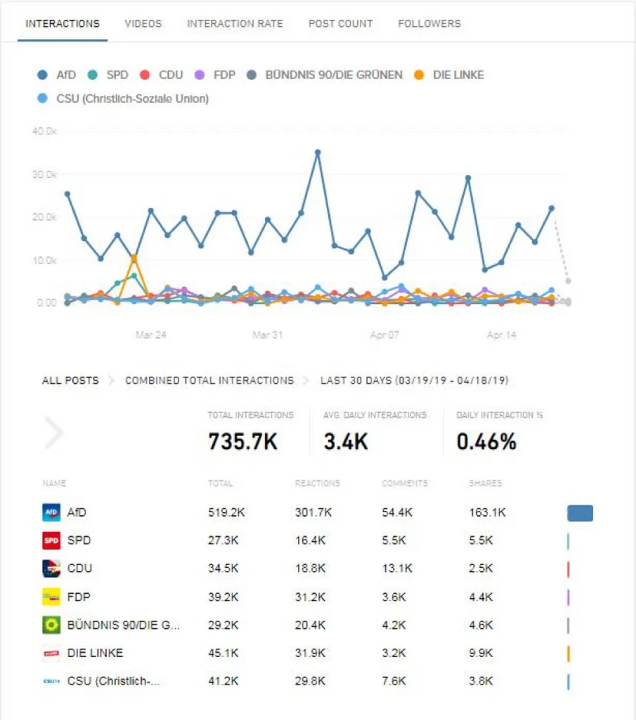
Although engagement with the content varied significantly, the number of posts by the parties was relatively equally distributed. While the AfD published the most content, at 100 posts within the period of analysis, other parties, particularly the CSU and FDP, came close to AfD’s publishing rates with 90 and 81 posts, respectively. Therefore, engagement with content on the parties’ Facebook pages did not necessarily correlate with the number of posts. The timing of the posts was less consistent, with the AfD posting at a relatively constant rate in comparison the other parties, which might have contributed to a greater engagement — too many posts in a shorter time period can lead to timeline dilution, decreasing the chance of engagement across a number of posts.
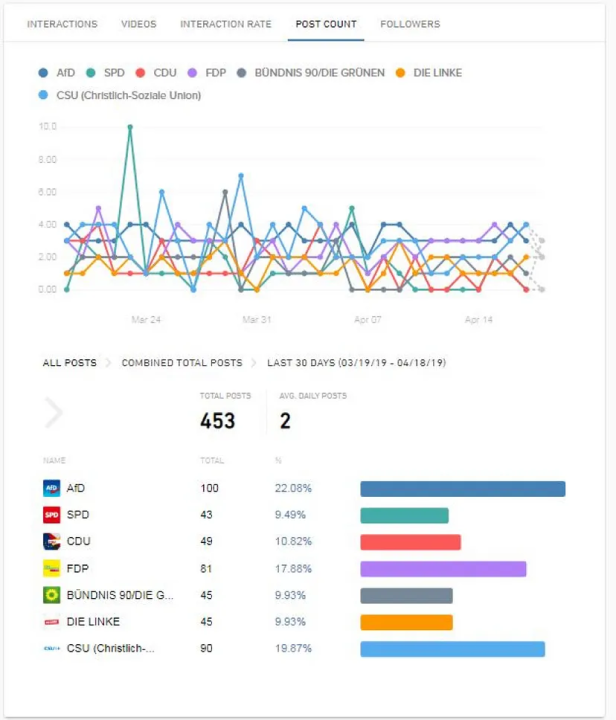
The other parties’ pages emphasized similar types (e.g., photos, videos) of content, so AfD’s outsize engagement is more likely to be one of substance than of presentation.
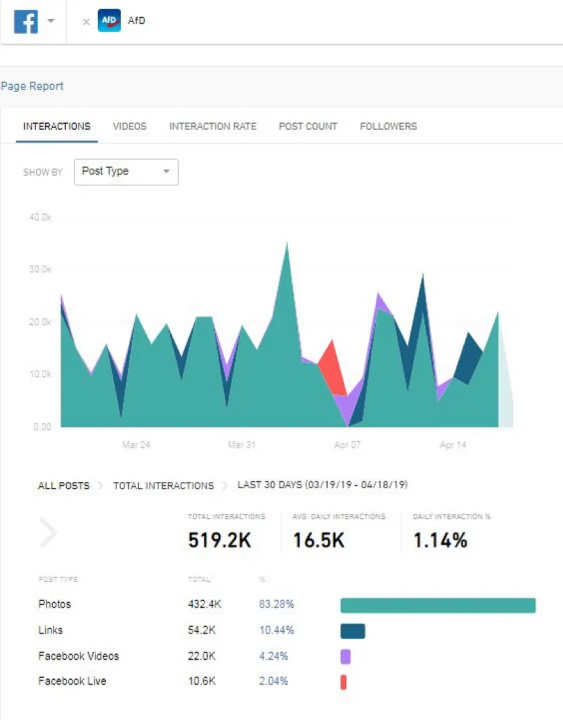
Out of all engagement types with content on the AfD’s Facebook page, the most featured engagement types were likes (34.95 percent), shares (31.41 percent), and the angry emoji (16.99 percent). On the last, the content of the other parties’ Facebook pages garnered significantly fewer angry emoji responses, with the exception of the CDU, where the angry emoji was the third most common response (7.5 percent).
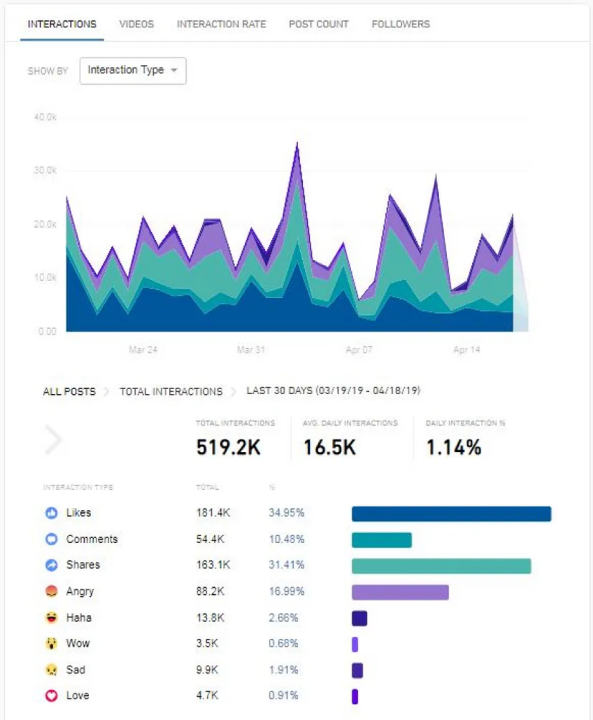
Conclusion
A significant number of posts among the most engaged-with Facebook posts featuring German keywords in regard to the EP elections were directly affiliated with the populist party Alternative for Germany (AfD). While the first analysis based on CrowdTangle’s database is not representative, it does suggest a disproportionately favorable engagement trend for AfD.
The different types of Facebook engagements, such as likes, comments, or specific emoji reactions, do not necessarily reflect approval or disapproval for the AfD’s message; nevertheless, they do affect the reach of the AfD’s messaging on Facebook. Due to the platform’s algorithm, Facebook posts with higher engagement rates generally tend to appear more often on users’ newsfeeds, and thus have better reach on the platform. To the detriment of the pro-European parties and their content on Facebook, the AfD’s high overall engagement rates could contribute to the increased reach of the AfD’s populist content on Facebook ahead of the European Parliament elections.
Register for the DFRLab’s upcoming 360/OS summit, to be held in London on June 20–21. Join us for two days of interactive sessions and join a growing network of #DigitalSherlocks fighting for facts worldwide!

